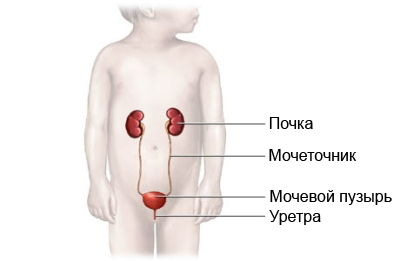Bed-wetting – Enuresis
Description enuresis
Urinary incontinence – involuntary urination during sleep in children over five years. Usually aged 3 to 5 years, children become able to sleep through the night without urinating. Although infection or anatomic abnormalities of the urinary system can sometimes explain bedwetting, in most cases have no explanation for nocturnal enuresis.

Causes of enuresis
When the children are asleep, the bladder may signal the brain, it is full. Then the child must wake up and go to the toilet.
The reasons are different, and enuresis may overlap. Factors, promoting enuresis include:
- Bladder control is slower than usual;
- Greater, than the average, production of urine during the night;
- Genetic predisposition;
- Sleep disorders, sometimes associated with enlarged tonsils or adenoids.
In rare cases,, bed-wetting may indicate a physical problem. Usually, If the problem is complex, incontinence also occurs in the afternoon. Disease, which may cause enuresis include:
- Infections of the kidneys and bladder;
- Kidney disease;
- Diabetes;
- Nesaharnыy diabetes (very rare disease, in which the normal sugar, but excess water is excreted by the kidneys);
- Congenital abnormalities of the urinary bladder, kidney, or abnormalities nevrologicheskie.
If the child will have none of the above mentioned diseases, enuresis actually stops when it reaches sexual maturity. But, bedwetting is a problem for 1 % Adult.
Risk factors
Factors, increases the likelihood of enuresis:
- The presence of family members with a history of urinary incontinence;
- Significant psychosocial stress:
- Moving to a new home;
- Losing a loved one;
- The emergence of a new baby in the house;
- Physical or sexual violence.
Symptoms of enuresis
The child wakes up and finds the bed wet from urine.
Diagnosis enuresis
The doctor asks about the symptoms and medical history, and performs a physical exam. Questions may cover the following topics:
- A family history of urinary incontinence;
- Problems urinating, such as pain or weak stream;
- The amount of fluid intake;
- Type of fluid intake;
- The presence of blood in urine;
- Children's emotional response to the behavior;
- The presence of psychological trauma.
Tests may include:
- A study of a urine sample, resulting in the morning, to determine the composition of urine, as well as check for infection and other problems with the urinary tract;
- X-ray or ultrasound, If a physical cause is suspected (rarely).
The doctor may refer the patient to one or more specialists, eg, to the doctor “ear, throat, nose”, if there is evidence of obstructive breathing at night or a psychiatrist, if there are significant emotional problems.
Treatment of nocturnal enuresis
Treatment is aimed at a gradual reduction of the frequency of urinary incontinence, until the child has to get rid of.
Motivation and Family Support
Urinary incontinence is seldom a deliberate act. Children, usually, upset and ashamed, when this happens. You can not punish the child. Very important, to convince parents of the child, incontinence that will pass with time. You can not let siblings tease the child who wets the bed.
After 18:00-19:00 pm fluid intake must be limited, and the child must urinate before going to bed. At the end of the day should also avoid sugar and caffeine.
Behavioral Treatment
The doctor may recommend a special device, such as a pad with a buzzer, that sounds when it gets wet. The baby is laying in his underwear. The buzzer wakes the child, urging him to get up and use the toilet. Parents, perhaps, should help the child get to the bathroom and turn on the unit again.
Most research suggests, that this form of treatment is the highest success rate and the fewest complications.
Bladder training
Some doctors believe effective stretching exercises bladder, but there are no studies, confirmatory, This approach works. During waking the child gradually increases the amount of time, which runs between urination. You can not try this method, without talking to your doctor.
Medications
Drugs to treat symptoms include enuresis:
- Desmopressin – hormone available in tablet form to reduce urine production;
- Ymypramy – antidepressant, which reduces the depth of sleep, and can also reduce the frequency of micturition;
- Oxybutynin – anticholinergic agent, which can be used, but it has a low performance.
Prevention enuresis
Prevention of urinary incontinence in children, not prone to primary nocturnal enuresis has limited effectiveness. Since excess intake of fluid is rarely the cause of enuresis, limiting fluids before bedtime does not give consistent results. Nonetheless, it would be reasonable, that all children empty the bladder before going to bed.
